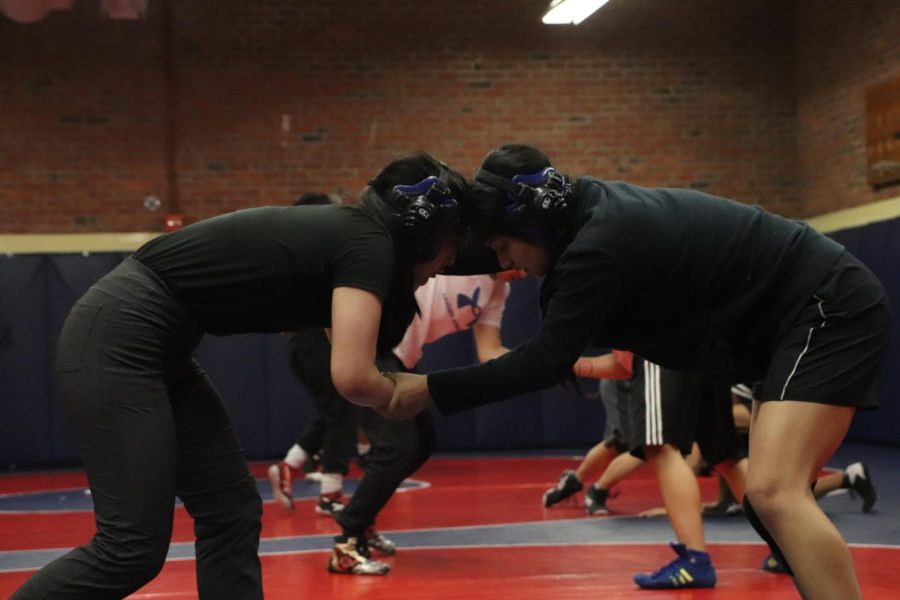Wrestling against gender stereotypes
By not allowing stigmas prevent them from enjoying the sport, female wrestlers show their resilience and prove that they too deserve to compete in the playing field.
February 6, 2023
“‘You look really scary for a girl,’” junior and varsity wrestler Claire Lucas said, recalling what someone told her at a past tournament. “Those words stuck with me for a long time.”
While Lynbrook has always strived to foster a welcoming environment for female athletes, wrestling has always been a male-dominated sport and often comes with gender-based stereotypes against female wrestlers. The most common stereotype that Lynbrook wrestlers have reported hearing or experiencing is that women are not fit for this sport because they are physically not strong enough. However, people within the wrestling community tend to agree with each other that women are just as capable as men of succeeding in wrestling.
At the beginning of senior and varsity wrestler Faith Wang’s wrestling journey, she often felt distant from her male teammates and received more lenient treatment than others. Realizing the inherently unequal treatment, the varsity team, including both girls and boys, hosted a meeting with their coaches in which they discussed their new priority to emphasize equal treatment toward all genders.
“Our team is like a family,” Lynbrook coach Steve Weng said. “The wrestlers treat each other equally and respect and help each other tremendously.”
A large part of why girls may feel discouraged from wrestling stems from body image insecurities. Wrestlers may feel the need to have a more “masculine” build and “mean” face in order to be strong and intimidating enough. However, a wrestler’s appearance does not solely reflect their performance. Although boys indeed have a biological strength advantage over girls, a wrestler’s success is also achieved through other factors, including consistent training in cardio, technique and mentality — none of which differ between genders.
“I remember there was a coach in our league who didn’t think girls could wrestle, and I walked into their gym once with eight girls on our team of 18,” said Sergio Gonzales, Miller Middle School wrestling coach. “The other team was giggling, but they weren’t giggling when we were done with them. We won.”
Having female role models on the team is also a large motivator for interested female athletes to join wrestling. Lucas’s journey began with Miller’s team in her sixth grade, and while there were not many girls on the team, there were two older female wrestlers who were well-respected by their coaches and teammates. Their presence alone helped Lucas feel like she belonged.
“Even though I didn’t know those two girls when I joined, they made me feel that being able to wrestle was a goal that I could attain,” Lucas said. “I wanted to do the same for other girls so they could join and also have someone to look up to.”
After visiting Miller a few years later as a high schooler, Lucas saw about 30 girls in the wrestling room. Reflecting on when there were only five girls on her Miller team, Lucas realized how her influence has rippled an interest in the sport among even more girls.
Title IX, established in 1972, requires schools to provide all genders equitable opportunities in programs receiving federal financial assistance. Thus, public schools that wanted to invest in their boys’ wrestling programs were also expected to build up their resources for girls too. This has helped bring more tournaments, scholarships and proper equipment to female wrestlers.
To cultivate an environment where both male and female wrestlers can equitably grow, Lynbrook wrestlers stressed the importance of allowing teammates to practice wrestling with each other no matter their gender. The team has found that having all genders practice with each other is a valuable experience for improvement, elimination of stereotypes and a sense of team unity.
“As long as you have a partner who is pushing you hard enough, it doesn’t matter if they’re a boy or girl,” senior and varsity wrestler Mohong Li said. “I’ve had plenty of female wrestling partners, and they all have the same abilities and train as hard as everyone else.”
By not letting these stigmas prevent them from enjoying the sport, female wrestlers demonstrate their resilience and prove that they, too, deserve to compete in the playing field.
“The world is sexist, and women get less recognition for the same things that men do,” Gonzales said. “If they’re going to wait around for the world to respect them, it’s probably not going to happen in their lifetime. As a non-male, they’re going to have to demand respect from the people around them, and maybe that’s through wrestling. They’ve got to go out there, earn it, take it and be willing to stand up for who they are.”





































































Diego Reyes • Feb 13, 2023 at 7:21 pm
great job ♀️♀️♀️